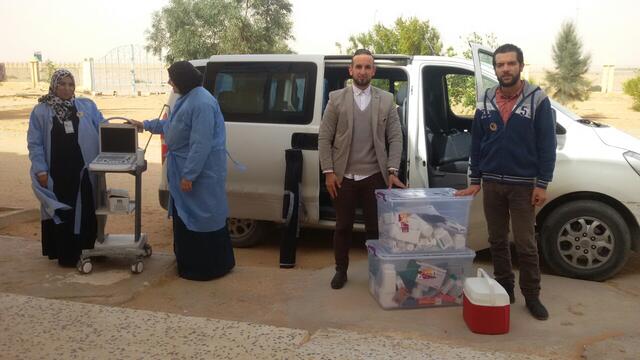How do you provide life-saving medical care in a war torn country?
Rent a van. An in-obtrusive van with room enough for a doctor, a gynecologist, a pharmacist and a nurse, stock it with pharmaceuticals, fill up the tank, and send it on its way.
This is how the International Rescue Committee is responding to the dire need for health care in Western Libya.

1.1 million people are in need of health care in Libya. Health clinics are operating at less than half of their capacity. This means that if you are sick in Libya, you have less than half a chance of getting the medical services you require. Basic medicine is in short supply. If you need a drug like insulin to treat diabetes or an antibiotic to tackle pneumonia you have a slim chance of being able to acquire it. If you are a woman, your chance of access to specific care is even less. According to the World Health Organisation, only 1.6% of primary health clinics can provide family planning services.
Such is the reality of life for people in Libya. Three governments compete for control and well over a thousand militias fight for territory.
Do you travel miles navigating rival militia check points to see a doctor? Or do you stay home and hope that what ails you will heal on its own?
General lawlessness surrounds you. Intercommunity tension is high. Kidnappings and highway robbery are the norm. Which prompts many to question whether it is worth the risk to seek medical attention at all. Do you travel miles navigating rival militia check points to see a doctor? Or do you stay home and hope that what ails you will heal on its own?
Fortunately in communities surrounding Misrata and Sirte in Western Libya, people don’t have to ask that question. The locals now know that on a particular day in a particular community, the IRC’s medical team will be there. They will pull up outside the local medical clinic in that unassuming, humble van, take up position in the treatment room, and deliver free health care.
And the people line up to wait. They are a mixture of locals and Libyans who have been displaced by the conflict. They will wait patiently to see the doctor or the gynecologist. Usually, when the van arrives, there is already a line outside the door.
The needs are immense.
Without treatment, a common cold can turn into pneumonia.
Without treatment, a common cold can turn into pneumonia. A simple ear infection can become so bad a patient risks becoming deaf. Chronic illnesses like diabetes or high blood pressure can become life threatening. And a simple pregnancy can become complicated, purely for lack of care.
Add to this the fact that unrelenting conflict wreaks havoc on a country’s economy. The patients who receive the IRC’s services have either very little money or none. Some have not been paid in months. There is no money in the bank. They have no access to cash. Generic drugs now cost three times their value. Medication is an extravagance they can no longer afford.
“All the patients who come to us are in need,” says IRC gynecologist, Dr Hamida, “And they are happy with the services we are providing for them.”
About 50% of the patients Dr Hamida sees are pregnant. They must receive the care they need to ensure a healthy baby. Because of the conflict and the high cost of basic items, fresh fruit and vegetables have become a luxury. These mums-to-be must make do with vitamins and supplements. Which will come from the back of this van.
Given the circumstances in which they live, it is no surprise that most patients treated by the IRC suffer from post-traumatic stress disorder.
“People are stressed and angry because of the war,” Dr Hamida says. “A lot of mothers mention their sons and fathers who have died in the war.”
The IRC’s medical team in Libya is Libyan. They are young doctors, one of whom has only ever been a doctor in war. Dr Bahaa graduated in 2011, the year Libya’s civil war began. He says it is “special” to be able to train in such a stressful environment.
“There is a lot of opportunity to learn that you wouldn’t get in other places.”
That’s certainly one way of looking at it.
And so, every weekday, Sunday through Thursday, IRC teams load up that van, get the latest security briefings from their colleagues, determine their route and head out into the community. They will travel the highways of Western Libya and pull up at clinics in small communities to deliver life-saving care.
They are expected there now.
With the support of EU Humanitarian Aid, the IRC is able to provide critical health care to communities impacted by Libya's ongoing conflict.